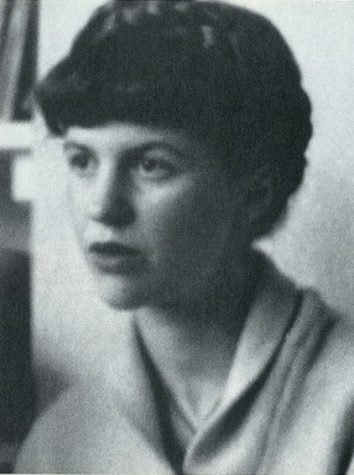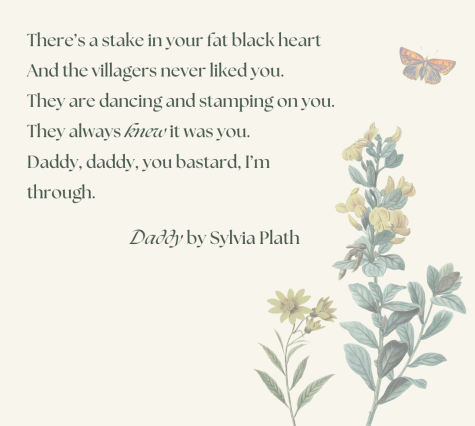Honoring the legacy of Sylvia Plath
Examining the life and works of the posthumous poet
February 11, 2022
TW: This story contains mentions of suicide and depression.
“I can never read all the books I want; I can never be all the people I want and live all the lives I want. I can never train myself in all the skills I want. And why do I want? I want to live and feel all the shades, tones and variations of mental and physical experience possible in my life. And I am horribly limited.” ~Sylvia Plath

I first read “Bell Jar” in eighth grade after picking it off my sister’s bookshelf. I was drawn to the static navy cover and the text that drew the same ambiguity. “Sylvia Plath” was written on the top and the name was so familiar that I needed to do a Google search to recognize where I heard her from — I had read her poem “Metaphors” and I remembered learning that she died by suicide afterwards. I read the description of the book and drawn in by the simplicity yet complexity of the plot synopsis, I turned the first page and immersed myself in her words.
Sylvia Plath died on Feb. 11, 1963 — 59 years ago. Though she is a poet often characterized by her death, recognizing how she was more than just a tragedy is the proper way to honor her legacy. Plath was a contemporary author who channeled her inner conflicts onto paper, producing literary pieces that wove between life and death, power and balance, breaking the traditional bounds of poetry and bringing awareness to the unbalanced dynamics present in society.
Plath was born in Massachusetts and discovered her literary talent at an early age. When she was eight, she published her first poem, soon entering and winning numerous literary contests. She wrote “confessional” poetry, reflecting on and deconstructing her identity. She went to Smith College on a scholarship to continue her journey as an aspiring poet. After graduating, she attended Newnham College in Cambridge, where she met Ted Hughes, whom she later married.
During her years as an undergraduate, Plath experienced strong symptoms of depression, writing in her journals that, “It is as if my life were magically run by two electric currents: joyous positive and despairing negative — whichever is running at the moment dominates my life, floods it.”
She overdosed on sleeping pills but soon recovered, receiving electro-shock therapy in mental institutions for treatment. During the 1900’s, therapy and mental illnesses were still relatively unknown and heavily stigmatized, which prevented Plath from receiving proper medicine and care. Her depression continued and heavily influenced her writing, her poems reflections of herself and fragments of her struggles.
Plath published her first collection of poems, “Colossus” in 1960, receiving warm reviews. At the time, she was well-known in the literary community but obscure from the public eye. However, at home, Plath’s marriage was falling apart and in 1962, Hughes had fallen in love with another woman and left her. In 2017, it was also revealed in a set of confidential letters that Hughes both emotionally and physically abused Plath.
During the final years of her life, Plath was thrown into an intensely tumultuous state that manifested in her writing. She published her only novel, “The Bell Jar,” a month before she died. The novel revolves around a young girl whose unsatisfactory experiences lead her down a path of depression. Although published under the pseudonym Victoria Lucas, “The Bell Jar” acts as a self reflection of Plath’s experiences, a fictional yet biographical narration that revealed the inner conflicts she felt.
It shed light on the gravity of mental illnesses and the stigma that surrounded them. The terrifying imagery of mental hospitals reflects the horror she felt as she was wheeled through them, illustrating the flawed institutions that she and many others experienced. Her honesty and willingness to describe the severity of mental illnesses put her outside the realm of traditional authors, earning praise from multiple critics.
When Plath died by suicide, she was 30 and had two children. After her death, Hughes took executive control of her works and published her second collection of poems, “Ariel.” The pages revealed Plath’s faltering mentality and the intensity that accompanied her writing during the struggle with herself. “Ariel” explored facets of not only Plath but society as a whole. Poems “Daddy” and “Lady Lazarus” addressed the power dynamics between men and women, exposing the oppression and internal conflicts women feel as they attempt to balance societal and internal expectations. Her pieces resonated with others, bringing light to their own mental abuses and validating the convoluted flow or reasoning that accompanies it.

“A Collection of Poems,” which included all her works from 1956 to 1963, won a Pulitzer Prize, granting Plath the honor of being the first author to receive the award posthumously.
Her impacts are still felt today. Plath not only influenced social change by highlighting the injustices rooted in modern institutions, but she also greatly shifted American literature. She expanded on the “confessional” writing style, developing a new prose that interweaved personal and cultural issues together to reflect deeper problems. Plath was also a spearhead that independently contributed to women’s movements through her refusal to conform to traditional gender roles.
After finishing “Bell Jar,” I felt closer to understanding Plath’s struggles and the pain she had to endure, even though I know that I can never fully empathize with her experiences. Her words resonated with my own and validated my internal thoughts and loose strands that poked out, carrying me away from the loneliness that accompanies it. Her writing has done the same for many others, bringing a sense of calmness in times of emotional turmoil and uncertainty.
On this day, we mourn a writer who not only struggled internally but one who also broke barriers by addressing issues others weren’t, paving the way for future writers to continue.
On this day we recognize Sylvia Plath’s legacy.
—
How to Seek Help:
1. National Suicide Prevention Hotline Lifeline — HOTLINE NUMBER: (800-273-8255)
2. IMAlive: Online Crisis Network that focuses on suicide intervention, prevention, awareness, and education — https://www.imalive.org/
3. SPRC: Suicide Prevention Resource Center — https://www.sprc.org/
4. SAMHSA: Substance Abuse and Mental Health Services Administration – https://www.samhsa.gov/find-help/national-helpline HOTLINE NUMBER: (1-800-662-4357)
5. Crisis Text Line — Text “Home” to 741741
6. AFSP: American Foundation for Suicide Prevention – https://afsp.org/suicide-prevention-resources



























